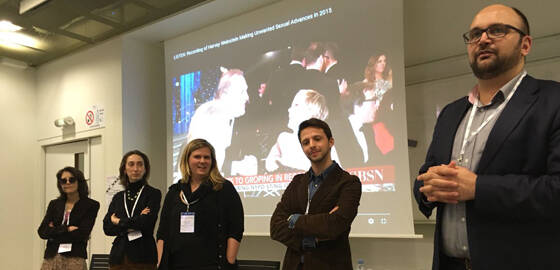HEC Seminar Scrutinizes Sexual Harassment in the Workplace
The fourth DiversiTALKS seminar, organized by HEC students and Professor Matteo Winkler on March 12, discussed the hotly-debated issue of sexual harassment in the workplace - and the challenges of breaking the silence after the Weinstein scandal. Two outside speakers joined HEC staff members and students of all levels; they provided legal and journalistic framework to a seminar which specializes in diversity and inclusion issues in the business world.

It is a slow (r)evolution, but it seems to be a real one. Recently released figures indicate that corporations are increasing their investments and confidence in French startups led by women. However, according to Professor Matteo Winkler this growing faith in women entrepreneurs in France does not mask the ongoing challenges faced by women in the workplace, notably in eradicating sexual harassment. The Italian law professor is specialized in diversity, LGBT and sexual rights and his regular DiversiTALKS seminar focus on such fault lines in the world of business. On March 12, he led a highly-topical session entitled “After Weinstein: Breaking the Code of Silence of Sexual Harassment in the Workplace”.
“There is a common thread in all the seminars we’ve organized in the past year,” he said when the 90-minute exchange with students and staff members was over. “In a nutshell: behind diversity, some people are more valued in a company than others. And this discrimination has an invisible cost: if you make people feel different in a working environment, they are less productive, they lose faith in their firm, they become ill in a toxic professional setting. It’s something I explore with my students, inciting them to measure its negative impact and insisting that inclusion is a mission.” Although figures are sparse and empirical studies hard to conduct, Winkler points to studies in his native Italy which revealed that 30% of gay workers who send in their CVs are rejected because of their sexual choices. “That means a third of this population are thrown out of the job market. And for highly-skilled gay men, it’s 80%! What a loss in productivity.”
The fourth DiversiTALKS seminar on the HEC campus in March witnessed a powerful intervention by Paris Bar Lawyer Choralyne Dumesnil, who specializes in cases involving sexual violence. In this context, she has been called on to defend women who are sexually harassed at their workplace. At the seminar, Dumesnil denounced the institutional and cultural barriers she faces. “Our justice system is failing women plaintiffs who take their alleged abusers to court,” she told the 40-strong audience gathered in the Bellon amphitheater. “Judges are not neutral, so men are not condemned, cases drag on for 5-10 years and damages are not at the level required for actually supporting victims. The media, meanwhile, do not show up to speak about the cases, from facts to conviction to damages. Yet these factors must evolve in order to eradicate sexual harassment in the working environment.”
US freelancer Lisa Bryant has been covering the upswing in women protest movements like Balance Ton Porc for a wide gamut of international radio stations. The Paris-based correspondent pointed to the difficulties of selling such court-based stories to her newsroom. More generally, Bryant described the challenges of persuading women to share their opinions on such charged topics: “Even simple vox pops in the streets can be a challenge, women don’t step forward to share with me their experiences or ideas. Instead it’s the men, usually young, who accept to testify.”
HEC’s Assistant Dean of Student Affairs, Marcelle Laliberté, underlined that the MeToo movement has been “a big eye opener for many of us because we could see the commonalities more than the differences”. The seminar panelist continued: “It’s all about the same thing: control over public space. Power. Putting women in their place. Telling them they are only safe as long as men choose to make them safe… Something that is true to all groups facing inequality… In fact, at any time, that safety can be taken away. And that is perverse.”
Matteo Winkler concluded the seminar with proposals to coerce companies with poor records in sexual harassment into tackling these abuses. This is a suggestion the Italian law professor has been trumpeting in the media lately and it has been receiving wide coverage. “We demand disclosure. To make them accountable, companies should publicly declare how much they spend in settlement costs every year. Governments could even punish companies with obvious harassment issues.”
The students at the seminar responded strongly to the DiversiTALKS exchanges, both during the seminar and at the after-event cocktail. Some said the root cause for sexual harassment in business is the fact so few women are on company boards or in true positions of power. Another encouraged the idea of further debate, which would provide incoming students with greater insight into issues currently being explored at all levels of the business. Whilst a third believed that France was lagging behind the US in addressing the issue. “Things might be getting better overall,” she said, “but it needs for us to come together more in an almost revolutionary way. Because the imbalance remains that bad.”